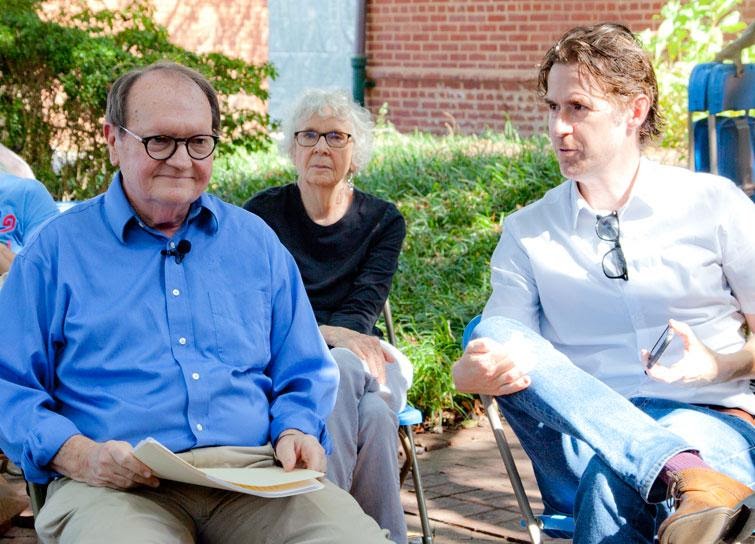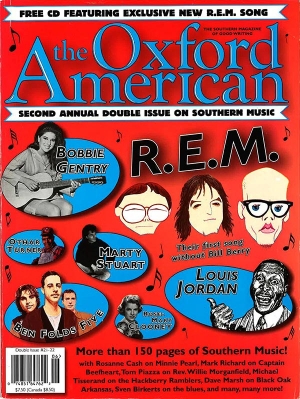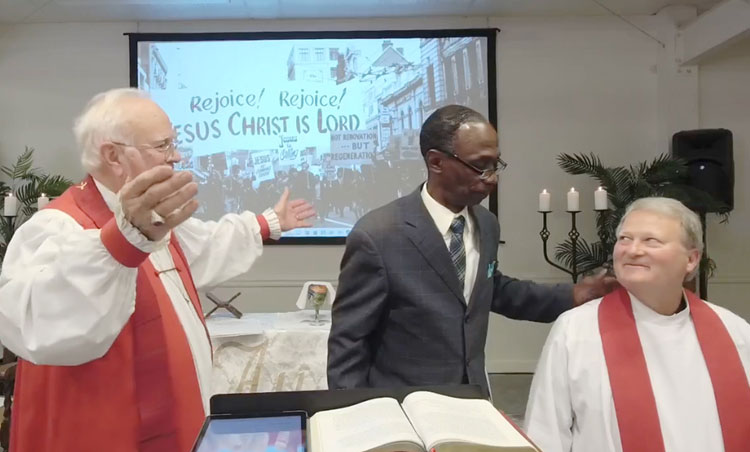
As part of the Center for the Study of Southern Culture’s Southtalks series, on October 13th Dr. Darren E. Grem introduced Dr. Charles R. Wilson,* who then delivered his paper on The Southern Cultural Renaissance of the Early 21st Century.
The genesis for the paper was Dr. Wilson’s grooving on the music of T Bone Burnett, an amazingly prolific and gifted contributor to pop culture for the past 50 years. It got Wilson cogitatin’ on how Roots Music brings past musical forms into the present, preserving them yet modernizing them — a rebirth, a regeneration, a renaissance.
From there, Wilson began to contemplate more generally the breadth and depth of Southern cultural creations of the past few decades. An idea for a formal paper began to take shape.

His paper is divided into 4 areas that are especially relevant to this regeneration: 1. Music, 2. Black Culture, 3. Ethnicites beyond Black and White, and 4. Literature. (Before getting into specifics, Wilson noted that questions arise as to whether a genre is being revived authentically, commodified, or parodied.)
In the Southern music revival category a blizzard of names came forth. Harry Smith’s 78 rpm collection of unpublished folk music from the 20’s to the 60’s was the source of material for the Folkways Records Anthology of American Folk Music. The Gospel music of the Ledbetters is in the mix. Vicksburg’s Bill Ferris contributed to the renaissance of a number of genres, including co-editing with Wilson the original Encyclopedia of Southern Culture.
The South is deservedly famous for birthing the Blues, Rhythym and Blues, Rockabilly, Gospel, and Country and Western. (Did I mention Jazz?) In recent decades there have been folk/pop hybrids, in some of which Elvis Costello and Sting made contributions. The soundtrack of O Brother, Where Art Thou exemplifies the trend.

Jim Crow laws ended in the late 60’s. Since then, there’s been a net population shift of Blacks from North to South.† Comedian Chris Rock has declared Atlanta the capital of Black America. New York Times columnist Charles Blow is calling for a Reverse Great Migration. Some films are now depicting Northern cities as being in decay, while Southern cities are shown as revitalized.
Jesmyn Ward grew up on the Mississippi Gulf Coast. After Hurricane Katrina changed the lives of her and her family, she focused on her gift for writing and has emerged as a top-tier author. She attests her love for “the many Souths” —notwithstanding the Confederate flags, the GOP, and the history of lynchings.
Given that the population of the South (broadly defined) is about the size of the UK and France combined, it’s not surprising that there has long been more ethnic diversity in the South than many people realize. It’s also unsurprising that Hispanic peoples have been rapidly coming into their own as part of the cultural mainstream. One Latino star in the South’s cultural firmament is Gustavo Pérez Firmat, author of A Cuban in Mayberry, among other works. The Asian American population is growing more quickly in the South than in any other US region (with the exception of the West Coast).

Though Wilson didn’t mention it, I think he might agree that Southern storytellers have always enjoyed an unfair advantage over those from elsewhere. The others have to think up characters, motives, and plots. Southerners just have to change the names (and embellish a tetch). Sometimes they don’t even change the names.
Southerners’ facility for narrative encompasses high literature as well as popular music. The South’s 20th century literary renaissance included William Faulkner,‡ Katherine Anne Porter, Caroline Gordon, Allen Tate, Thomas Wolfe, Robert Penn Warren, Tennessee Williams, William and Walker Percy, Margaret Mitchell, Flannery O’Connor, Eudora Welty, and Harper Lee.
The South’s 21st century literary pantheon includes, as noted, Jesmyn Ward, as well as Toni Morrison,§ Kiese Laymon, Ann Beattie, Betty Adcock, Donna Tartt, and Barbara Kingsolver.
Other avenues of Southern literary revival are in magazine format. Wilson brought a stack that included the award-winning Oxford American. Renaissance literally means rebirth, and Oxford American has been born again several times.
As every Oxonian knows, many people come here to visit, or are just passing through — and simply don’t leave (at least not for a while). In a classic you-never-know story, a San Franciscan high school dropout, Marc Smirnoff, stopped in Oxford for car repair, then got a job at Square Books, and in 1992 founded a literary magazine, The Oxford American, which against long odds has published 112 quarterly issues so far.
Before the 2006 launch of The Local Voice by Publisher Newt Rayburn and Editor-in-Chief Nature Humphries, Rayburn had been Art Director of The Oxford American from 1995 – 1999. The magazine’s first three annual Southern Music Issues (here, here, and here) were his conception. The 2nd of these, Summer 1998, won a National Magazine Award.
Now based in Little Rock, Arkansas, Oxford American’s current Editor in Chief is Danielle Amir Jackson.
The Bitter Southerner has more of an edge than most periodicals emanating from the South. In their own words, “If you are a person who buys the states’ rights argument … or you fly the rebel flag in your front yard … or you still think women look really nice in hoop skirts, we politely suggest you find other amusements on the web. The Bitter Southerner is not for you.”
Good Grit (not to be confused with the original Grit magazine) might be deemed the unbitter Southerner. It has a progressive perspective — but without rending of garments and gnashing of teeth.
The goal of Southern Style (aka SStyle) magazine is to “showcase beauty and talent globally”.

In the 1880’s, the Industrial Revolution was transforming agriculture in the US. The Progressive Farmer was founded in 1886 to help farmers make that transition from mules to machinery, as well as to lobby for farmers’ issues in a time of increasing urban political influence.
By the 1960’s, a much smaller slice of the Southland was farming and a much bigger portion could afford to spend money on signifiers of living well. In 1966, to concentrate its focus on the business of farming, The Progressive Farmer launched a Birmingham, Alabama-based lifestyle magazine, Southern Living. Originally de facto Whites-only, it has since incorporated diverse writers and subject matter. Its monthly circulation is close to 3,000,000.
Two generations later (2007) in Charleston, South Carolina, another Southern lifestyles magazine was born, Garden and Gun. The name, on the one hand, alludes to traditionally gendered leisure-time pursuits for Southern ladies and gentlemen. But it also subverts gender conventions, because the name also refers to an LGBT-welcoming nightclub from the Charleston of the 1980’s. In addition to typical lifestyle topics, G&G has been a platform for serious literature, including writers Pat Conroy, Roy Blount Jr., Donna Tartt, Julia Reed, Rick Bragg, John T. Edge, Jessica B. Harris, Allison Glock, and Kim Severson.
~~~~~~~~~~~~~~~~~~~~~~~~~~~~~~~~~~~~~~~
* Charles Reagan Wilson was the Kelly Gene Cook Sr. Chair of History and Professor of Southern Studies at the University of Mississippi, where he taught from 1981-2014. He worked extensively with graduate students and served as Director of the Southern Studies academic program from 1991 to 1998, and Director of the Center for the Study of Southern Culture from 1998-2007. Wilson received bachelor’s and master’s degrees from the University of Texas at El Paso and earned his PhD in history from the University of Texas at Austin. He taught at the University of Wurzburg, Germany, the University of Texas at El Paso, and Texas Tech University before coming to Oxford. Wilson is the author of Baptized in Blood: The Religion of the Lost Cause, 1865-1920 (1980), a study of the memory of the Confederacy in the post-Civil War South, Judgment and Grace in Dixie: Southern Faiths from Faulkner to Elvis (1995), which studies popular religion as a part of the culture of the modern South, and Flashes of Southern Spirit: Meanings of the Spirit in the U. S. South (2011). He is also co-editor (with Bill Ferris) of the Encyclopedia of Southern Culture (1989), which received the Dartmouth Prize from the American Library Association as best reference book of the year and is also general editor of the 24-volume New Encyclopedia of Southern Culture (2006-2013). He is editor or coeditor of Religion and the American Civil War (1998), The New Regionalism (1996), and Religion in the South (1985).
† To the chagrin of The New York Times and NPR’s local affiliate, WNYC.
‡Nobel Laureate in Literature, 1952.
§ Nobel Laureate in Literature, 1993.




